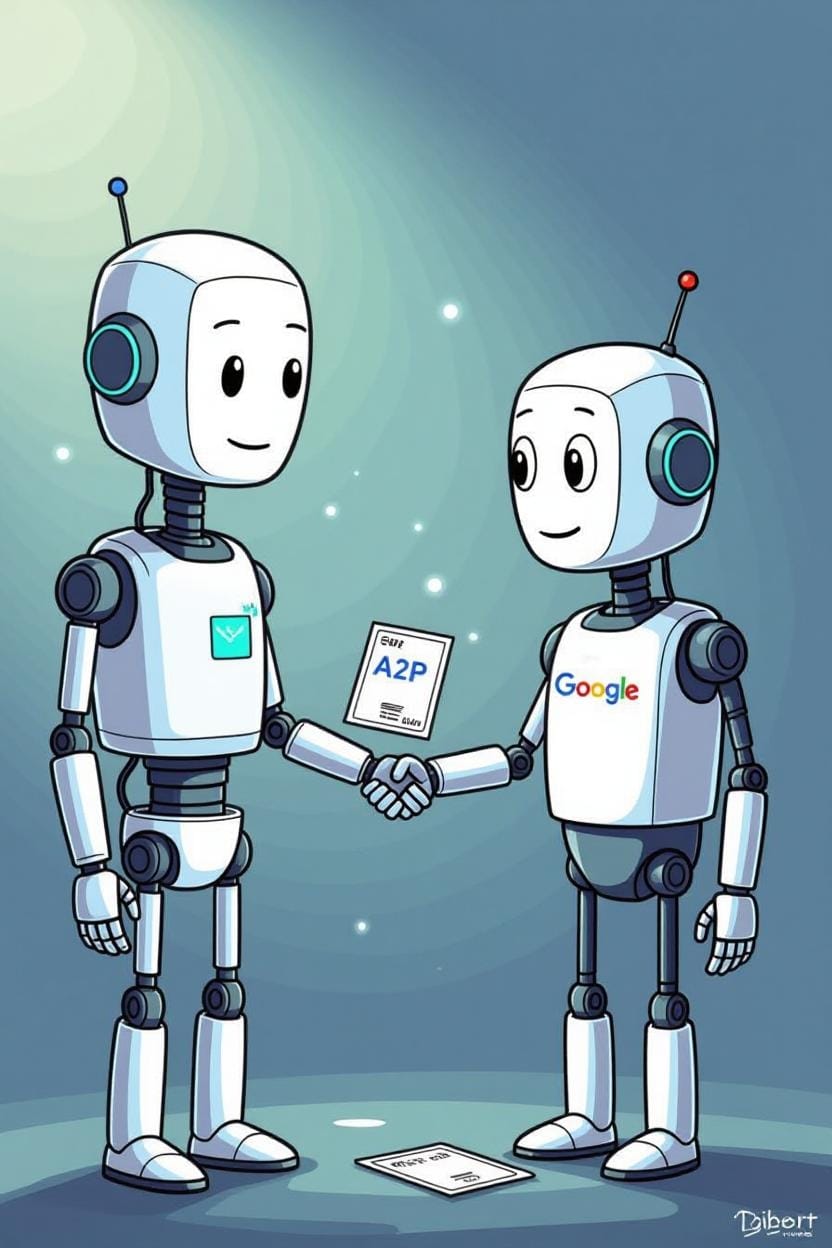Last week, during a conversation with a CTO friend in Berlin, he casually mentioned his AI assistant had just negotiated a 30% discount on their cloud infrastructure bill. Not him, his AI agent. It analyzed usage patterns, benchmarked pricing across providers, drafted the negotiation email, handled three rounds of back-and-forth, and executed the contract renewal. All while he was asleep.
"The crazy part," he said, sipping his flat white at St. Oberholz, "is that I couldn't actually let it complete the payment. That last step, transferring €47,000, still needed me to click 'approve' like it's 1999."
This is the paradox of 2025: We've built AI agents sophisticated enough to outperform MBA graduates in strategic negotiations, yet they can't buy a €2 coffee without human intervention. It's like giving someone a Ferrari but making them push it everywhere.
Google just changed that game entirely.
The Infrastructure Nobody Knew We Needed
When Google quietly launched the Agent Payments Protocol (AP2) in September 2025, most headlines focused on the sexy parts, AI agents shopping autonomously! Stablecoin integration! But they missed the real story.
AP2 isn't about enabling purchases. It's about solving the trust paradox that's been strangling the autonomous economy since day one.
Think about how payments actually work today. Every transaction assumes a human, with their unique biometrics, behavioral patterns, and legal accountability, sits at the endpoint. Our entire financial infrastructure, from PCI compliance to fraud detection, is built on this assumption. It's why your bank calls when someone uses your card in an unusual location. The system expects humans to behave like humans.
But AI agents don't have fingerprints. They don't have behavioral patterns that fraud systems can learn. They can't be sued. When an agent initiates a payment, the system has no framework for answering three fundamental questions:
- Authorization: Did a human actually approve this?
- Authenticity: Is this real intent or an AI hallucination?
- Accountability: Who's liable when things go wrong?
Without answers, the autonomous economy was stuck in demonstration mode. Impressive demos, no production deployments.
The Mandate System: Cryptographic Trust at Scale
AP2's breakthrough isn't technical complexity, it's philosophical clarity. Instead of trying to make AI agents look like humans to existing systems (which is what everyone else attempted), Google created a new trust layer that sits above traditional payments.
The system works through cryptographically-signed "Mandates", think of them as smart contracts for the real world, but without the blockchain overhead.
Intent Mandates are the workhorses. A user might authorize: "Buy winter jackets under €200 when available in green." The agent gets a cryptographic proof of this authorization that merchants can verify. No more "trust me, my human said it's okay."
Cart Mandates maintain human oversight for larger purchases. The agent negotiates and assembles the cart, but needs explicit approval before execution. Perfect for B2B procurement where agents handle complexity but humans control budgets.
Payment Mandates are the clever bit, they don't contain payment details at all. They're just signals to payment processors that an AI agent is involved, triggering enhanced monitoring without requiring infrastructure changes.
What's brilliant here is the separation of concerns. Payment credentials never touch the agent layer. PCI compliance remains intact. Existing payment rails work unchanged. It's like adding a new protocol layer to the internet stack without modifying TCP/IP.
Why German Enterprises Should Care (Deeply)
Here's what my LinkedIn feed keeps missing: Germany is accidentally perfect for this revolution.
Start with the numbers: 946 fintech startups, 64% fintech adoption rate, and—crucially, a SEPA instant payment system processing 1.2 billion transactions daily. While Americans debate whether Venmo or Zelle is better, Germans have had instant, interoperable, bank-grade payments for years.
But the real advantage is cultural. German businesses don't chase shiny objects, they optimize processes. And AP2 is, fundamentally, a process optimization play.
Consider a typical German Mittelstand manufacturer. They're already using SAP for ERP, have sophisticated supply chain management, and pride themselves on efficiency. Their procurement team spends 40% of their time on routine reordering, vendor management, and price negotiations.
With AP2, those procurement agents become actual agents—AI systems that monitor inventory, predict demand, negotiate with suppliers, and execute purchases within pre-approved parameters. The €200k procurement specialist doesn't lose their job; they stop doing repetitive tasks and start setting strategic parameters.
One startup in Munich is already piloting this. Their AI agent manages relationships with 47 suppliers, automatically reordering based on production schedules, negotiating volume discounts, and even switching suppliers when quality metrics slip. Time from stockout detection to reorder? 3 minutes. Human involvement? Zero, until the monthly strategy review.
The Competitive Moat Nobody Talks About
Everyone's focused on Google's first-mover advantage, but they're missing the real moat: network effects with a twist.
Traditional network effects are simple, more users make the platform more valuable. But AP2 has three interlocking network effects:
- Agent Network: More agents mean more sophisticated multi-agent transactions
- Merchant Network: More merchants mean more agent utility
- Trust Network: More successful transactions mean better risk models
This creates a fascinating dynamic. Early adopters don't just get first-mover advantage, they help train the risk models that become the competitive moat. It's like being paid to dig your own defensive trench.
The European players understand this. Nexi (processing €530 billion annually), Adyen, and Revolut aren't just "partners", they're co-creating the risk frameworks that will define autonomous commerce. When American companies eventually adopt AP2, they'll be using trust models trained on European transaction patterns.
There's delicious irony here. Europe, often criticized for overregulation, has created the perfect sandbox for autonomous payments. GDPR-compliant by design? Check. PSD2 Strong Customer Authentication? Built in. EU AI Act compliance? Native to the architecture.
The Use Cases That Actually Matter
Forget the "AI buying your groceries" demos. The real money is in B2B.
Dynamic Software Licensing: Imagine your infrastructure automatically scaling licenses based on usage, negotiating volume discounts in real-time. One Frankfurt-based hedge fund is piloting this with their Bloomberg terminals—their agent monitors trader activity and automatically adjusts terminal licenses daily, saving €2 million annually.
Supply Chain Orchestration: A Stuttgart automotive supplier has agents managing relationships with 200+ vendors. The system doesn't just reorder parts, it predicts supply chain disruptions, automatically sources alternatives, and maintains optimal inventory levels. Human procurement staff now focus on strategic vendor relationships rather than spreadsheet management.
Energy Arbitrage: With volatile energy markets, German manufacturers are using agents to automatically shift production schedules based on electricity prices, pre-purchase energy during low-demand periods, and even sell excess capacity back to the grid. All executed autonomously within pre-set parameters.
The pattern is clear: AP2 shines where complexity meets repetition. Tasks that require intelligence but follow patterns. Decisions that need context but have clear parameters.
The Stablecoin Subplot
The x402 extension, developed with Coinbase and the Ethereum Foundation—deserves its own analysis. While traditional payments move at banking speed, stablecoin settlements happen instantly. This isn't just faster, it's fundamentally different.
Instant settlement enables business models that were previously impossible. Micropayments for API calls. Real-time revenue sharing. Dynamic pricing that actually adjusts by the second. Pay-per-use everything.
But the real innovation is programmable money. Smart contracts handling escrow, automatic refunds when SLAs breach, or payments that release based on IoT sensor data. The agent economy isn't just automated, it's programmable.
German businesses, despite their traditional banking preferences, are surprisingly well-positioned here. The digital euro trials, strong regulatory framework, and cultural emphasis on stability make stablecoins less "crypto" and more "digital cash."
The Risks Everyone's Ignoring
Of course, this isn't without risks. The optimistic takes are flooding LinkedIn, but let's be realistic about the challenges.
Adversarial Agents: What happens when agents start gaming each other? We've already seen preview of this with algorithmic trading, flash crashes caused by algorithms reacting to algorithms. Now imagine that in every market.
Hallucination Liability: Yes, mandates provide authorization proof, but what about execution errors? If an agent misinterprets a mandate and orders 10,000 widgets instead of 10, who pays? The legal frameworks don't exist yet.
Privacy Paradox: AP2 agents need extensive access to understand context, calendar, email, financial records. The same GDPR that makes Europe attractive for AP2 could also constrain its most powerful use cases.
Concentration Risk: If Google controls the protocol that powers autonomous commerce, they effectively become the tax collector for the AI economy. The "open" protocol still routes through Google's infrastructure.
What This Actually Means for German Founders
If you're running a startup in Germany, you have three options:
Option 1: Ignore it. Reasonable if you're in deep tech or biotech. Not everything needs AI agents making purchases.
Option 2: Integrate it. If you're in fintech, e-commerce, or B2B SaaS, start experimenting now. The protocol is open, the documentation is solid, and early integration gives you competitive advantage.
Option 3: Build on it. The real opportunity isn't using AP2, it's building the layer above it. Tools for mandate management. Risk assessment for agent transactions. Multi-agent orchestration platforms. The infrastructure for autonomous commerce is just beginning.
The smartest play might be the most boring: focus on compliance and trust. Every enterprise wanting to use AP2 will need help with mandate management, audit trails, and regulatory compliance. The Salesforce of agent payments doesn't exist yet.
The 2030 Scenario
Fast forward five years. Your morning looks different.
Your personal AI assistant has already renegotiated your mortgage rate (saved 0.3%), switched your electricity provider (€50 monthly saving), and bulk-purchased household supplies with three neighbors for a volume discount. Your company's agents have optimized cloud spending, rebalanced the investment portfolio, and identified three acquisition targets that match strategic parameters.
You haven't eliminated human decision-making, you've elevated it. Instead of clicking "buy" 50 times daily, you're setting strategies, defining parameters, and handling exceptions. The mundane became autonomous. The strategic remains human.
This isn't science fiction. Intuit is already building "done-for-you" financial services. ServiceNow has autonomous procurement in production. The infrastructure exists today.
The question isn't whether the autonomous economy is coming, it's whether European businesses will help build it or simply consume it. With AP2, Google has provided the infrastructure. With SEPA, strong fintech ecosystem, and regulatory clarity, Europe has the foundation.
The rest is execution.

